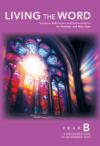Scripture Study for
First Sunday of Lent
Genesis 9:8–15 / Psalm 25:10 / 1 Peter 3:18–22 / Mark 1:12–15
<< Back to LECTIONARY RESOURCES
Understanding the Word
By Br. John R. Barker, OFM
The flood in Genesis is God’s initial response the fact of human wickedness, which had filled the entire earth with corruption (Genesis 6:11–13). Afterward, God recognizes that this has not solved the problem of the human heart, whose “desires . . . are evil from youth” (8:21); a new plan will have been put in place. In the meantime, God establishes a covenant, not just with human beings but with “every living creature.” This covenant is an expression of God’s commitment to all that has been created. Even though human sin has brought corruption to the whole earth, God does not turn away, but prepares the way for a new plan that will address the problem of the human heart.
The author of First Peter refers to the time of Noah from two perspectives. The identity of the “spirits in prison” to whom Christ preached possibly refers to the spirits of those whose disobedience occasioned the flood. The point is that the account of the suffering, death, and exaltation of Christ should encourage his audience in their own sufferings (3:13–17). Peter also ties the flood narrative to baptism, suggesting that Noah and his family were “saved through water” (although actually they were saved from water). Through baptism one is renewed through the power of Christ. The “appeal” might also be translated “pledge of good conscience,” meaning that for their part humans promise to allow their lives to be renewed and to be faithful, particularly in a time of suffering.
In Mark’s account of his temptation, Jesus is in the desert “among wild beasts,” which represent the “wildness” of the desert as a place of spiritual struggle, as in the Exodus account. As in that same account, Jesus is attended by angels, agents of God’s protection. Jesus relives the experience of Israel, but unlike them he does not succumb to temptation. His proclamation is simple: The promised reign of God, in which all will be ordered according to God’s will, is coming to pass. The human response is twofold: Believe that God’s promises are being fulfilled and repent of any behaviors or attitudes that oppose the divine will.
